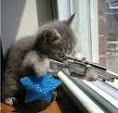Engineers had a series of checklists and diagrams that made up the two parts of the book on running a steam plant. The procedures for normal operation made up the Engineering Operational Sequencing System, or EOSS. The emergency procedures made up the Engineering Casualty Control System, or ECCS, and they were practiced by a set of exercises known as the Basic Engineering Casualty Control Exercises, or BECCEs.
BECCEs often involved wrapping up the engineering plant, which was no big deal in a twin-screw ship, as you practiced on one plant and steamed the other. On single-screw ships, it was a big deal, as doing boiler drills meant the ship went "hot, dark and quiet" at different times during the drills. For that reason, the XOs wanted BECCEs to be done on the midwatch, so that the flickering of power "wouldn't upset the ship's routine."
Engineers hated midwatch BECCEs. The engineering training team, which ran the BECCEs, had to be off-watch in order to run them. Both the officers and the sailors on the training team could count on maybe getting three hours of sleep on a BECCE night. Worse, to my mind, was the message that midwatch BECCEs sent to the engineers, which was "your drills are not as important as anyone else's". Operations and Weapons drills were run during the day; the only routinely run engineering drill that was run during the day was a main-space fire drill, as that drill took the ship to GQ.
I did see one time when a ship I was on ran BECCEs after lunch. The engineers were awed, even flattered, that their drills were being run during the working day. It was a simple thing, but it made a huge impact on their morale. The XO, though, was ripshit about the disruption to the work day of having the power go on and off as generators were taken offline and brought online.
The dumbest thing that the surface navy did to the engineers, though, was the "outchop OPPE", the "Operational Power Plant Examination" that was held as the ships steamed back from the Mediterranean for home. OPPE (the West Coast pukes called them OPRES, with the R for "readiness") were the major engineering inspection. Everything was examined, from training records and administrative records to normal steaming and casualty control drills. That meant that the engineers had to be be at their best as everyone else was mentally gearing up for coming home. Worse, the frigates who had towed array sonars almost always had their arrays out underway; they were reluctant to do full BECCEs because of the risk of damage from stopping while having an array out and the captains did not want to take the time to recover the array before the BECCEs and then deploy it afterwards.
To cut to the chase: On that series of outchop OPPEs, every twin-screw ship passed their OPPE. Every single-screw ship failed. From what I heard, life on those ships that failed was not much fun for the next few months.
No other major inspection was done in the Navy that way. Only the engineers had to spend their deployed time training and preparing for a major inspection. This sent a message to the engineers that their time, their work, was not as valued as the other departments, that their training and readiness was less important to the Navy, so let's just work the engineers harder on deployment so as to not take any time when the ships were home.
The message was received loud and clear.
Happy New Year!
20 hours ago

No comments:
Post a Comment